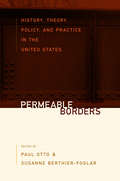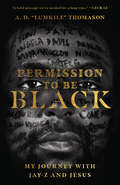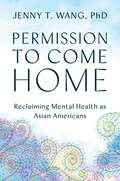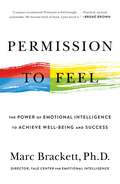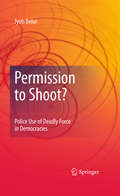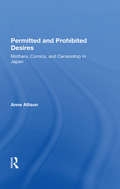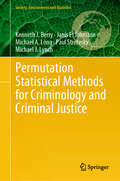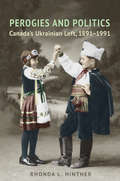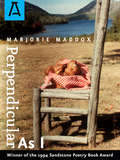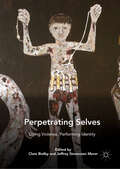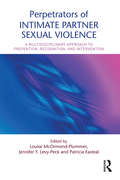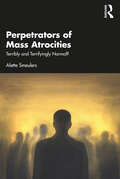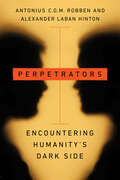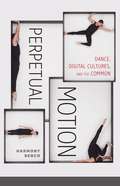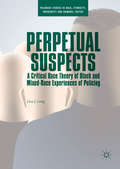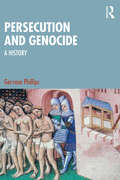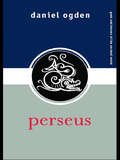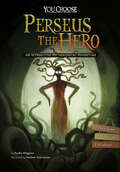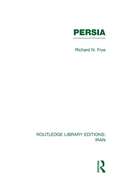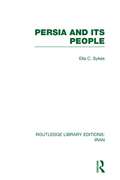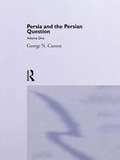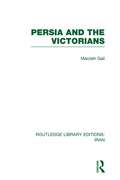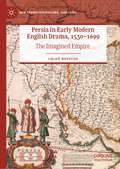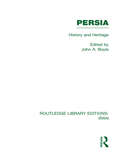- Table View
- List View
Permeable Borders: History, Theory, Policy, and Practice in the United States
by Paul Otto Susanne Berthier-FoglarIf the frontier, in all its boundless possibility, was a central organizing metaphor for much of U.S. history, today it is arguably the border that best encapsulates the American experience, as xenophobia, economic inequality, and resurgent nationalism continue to fuel conditions of division and limitation. This boldly interdisciplinary volume explores the ways that historical and contemporary actors in the U.S. have crossed such borders—whether national, cultural, ethnic, racial, or conceptual. Together, these essays suggest new ways to understand borders while encouraging connection and exchange, even as social and political forces continue to try to draw lines around and between people.
Permission to Be Black: My Journey with Jay-Z and Jesus
by A. D. ThomasonEmbracing your Christian identity does not make you "soft." Embracing your Black identity does not make you less Christian. Throughout American history, Black people were not given the freedom to acknowledge their suffering. A. D. Thomason believes that the Holy Spirit brings freedom and liberation as we're able to name our pain, recognize its roots in history and society, and seek healing. While many saw a confident, six-foot-five Black man, A. D. "Lumkile" Thomason lived most of his life in fear and anguish, deeply wounded by encounters with violence, abandonment, and family tragedy. Hiding behind a tough exterior, Adam earned his "Black card" but felt joyless inside. Even traveling around the globe to play professional basketball could not resolve his despair. But in the art of Jay-Z, A. D. discovered stirring honesty that gave voice to his own expressions of longing. And in the gospel of Jesus, he experienced the healing and salvation that had long evaded him. Now through what he calls "kingdom therapy," he's figuring out how to redefine the Jay-Z and Jesus that make up his blackness. A. D. uses his artistry as a poet and storyteller to share how he confessed his internalized pain and embraced the liberating joy of Christ. He writes for millennials, emerging adults, and anyone else who's ready to acknowledge the reality of racial trauma and our need to confront it. A. D.'s powerful story gives you permission to be Black, to be Christian, and to be the person God has made you to be.
Permission to Come Home: Reclaiming Mental Health as Asian Americans
by Jenny Wang&“Dr. Jenny T. Wang has been an incredible resource for Asian mental health. I believe that her knowledge, presence, and activism for mental health in the Asian American/Immigrant community have been invaluable and groundbreaking. I am so very grateful that she exists.&”—Steven Yeun, actor, The Walking Dead and MinariAsian Americans are experiencing a racial reckoning regarding their identity, inspiring them to radically reconsider the cultural frameworks that enabled their assimilation into American culture. As Asian Americans investigate the personal and societal effects of longstanding cultural narratives suggesting they take up as little space as possible, their mental health becomes critically important. Yet despite the fact that over 18 million people of Asian descent live in the United States today — they are the racial group least likely to seek out mental health services. Permission to Come Home takes Asian Americans on an empowering journey toward reclaiming their mental health. Weaving her personal narrative as a Taiwanese American together with her insights as a clinician and evidence-based tools, Dr. Jenny T. Wang explores a range of life areas that call for attention, offering readers the permission to question, feel, rage, say no, take up space, choose, play, fail, and grieve. Above all, she offers permission to return closer to home, a place of acceptance, belonging, healing, and freedom. For Asian Americans and Diaspora, this book is a necessary road map for the journey to wholeness. .
Permission to Feel: Unlocking the Power of Emotions to Help Our Kids, Ourselves, and Our Society Thrive
by Marc BrackettThe mental well-being of children and adults is shockingly poor. Marc Brackett, author of Permission to Feel, knows why. And he knows what we can do. "We have a crisis on our hands, and its victims are our children."Marc Brackett is a professor in Yale University’s Child Study Center and founding director of the Yale Center for Emotional Intelligence. In his 25 years as an emotion scientist, he has developed a remarkably effective plan to improve the lives of children and adults – a blueprint for understanding our emotions and using them wisely so that they help, rather than hinder, our success and well-being. The core of his approach is a legacy from his childhood, from an astute uncle who gave him permission to feel. He was the first adult who managed to see Marc, listen to him, and recognize the suffering, bullying, and abuse he’d endured. And that was the beginning of Marc’s awareness that what he was going through was temporary. He wasn’t alone, he wasn’t stuck on a timeline, and he wasn’t “wrong” to feel scared, isolated, and angry. Now, best of all, he could do something about it.In the decades since, Marc has led large research teams and raised tens of millions of dollars to investigate the roots of emotional well-being. His prescription for healthy children (and their parents, teachers, and schools) is a system called RULER, a high-impact and fast-effect approach to understanding and mastering emotions that has already transformed the thousands of schools that have adopted it. RULER has been proven to reduce stress and burnout, improve school climate, and enhance academic achievement. This book is the culmination of Marc’s development of RULER and his way to share the strategies and skills with readers around the world. It is tested, and it works.This book combines rigor, science, passion and inspiration in equal parts. Too many children and adults are suffering; they are ashamed of their feelings and emotionally unskilled, but they don’t have to be. Marc Brackett’s life mission is to reverse this course, and this book can show you how.
Permission to Shoot?
by Jyoti BelurExtrajudicial executions have blighted parts of the world for generations, but criminological coverage has been superficial and selective, in that it has concentrated on South America giving the impression that this is a problem specific to that part of the world and associated with military rule, dictatorial regimes and colonial heritage. Permission to Shoot?: Police Use of Deadly Force in Democracies brings a new dimension to the problem of police abuse of deadly force by concentrating on India and the United States, both large democracies and vibrant superpowers. In the book, the research is based on primary sources--interviews with police officers of varying ranks: those who are involved in the killings; those who facilitate such operations; and those who are mute spectators. The book deals with universal, fundamental themes such as: what makes ordinary, decent human beings do horrible things? What motivational techniques and justifications are used to override social norms governing moral conduct, centring on the sector of society mandated to use deadly force against civilians? Why in a democratic country the abuse of police powers appears to be overtly and tacitly encouraged? Permission to Shoot? seeks to provide broad guidelines and recommendations for reforms in policing policy and practice in developing countries. The research peels back the lies and deceit that surround this issue, but more than that it shows how those lies and deceit act to support the practice itself.
Permitted And Prohibited Desires: Mothers, Comics, And Censorship In Japan
by Anne AllisonDesire is both of and beyond the everyday. In an ad for running shoes, for example, the figure of a man jogging at dawn on the Serengeti Plain both evokes a fantasyof escape and invokes a disciplinary norm to stay fit. The bottom line for thead, of course, is to create a desire to consume, the promise being that with thepurchase of these shoes, the consumer can realize yet also transcend the daily exhortationto perform.To say this differently, there is something both real and phantasmic about desire.Yet this notion seems contradictory. Isn't there a difference between the desireto be fit, for example, which is realizable, realistic, and, in these senses, realand the desire to escape routine everydayness, which, for most of us, is inescapablemost of the time? But is exercise real or phantasmic? Certainly noteveryone works out, and even those who make exercise a part of their reality maydo so in order to pursue a fantasy about themselves. And are escapes from dailyroutines phantasmic or real? An escape from the everyday is far more realizablefor some people than even fitness. But here too what is fantasy blends into (andbecomes indistinguishable from) the real: A vacation away from work may be ameans of ensuring a higher level of work performance when one returns.
Permutation Statistical Methods for Criminology and Criminal Justice (Society, Environment and Statistics)
by Kenneth J. Berry Janis E. Johnston Michael J. Lynch Michael A. Long Paul StreteskyThis book takes a unique approach to explaining permutation statistical methods for advanced undergraduate students, graduate students, faculty, researchers, and other professionals interested in the areas of criminology or criminal justice. The book integrates permutation statistical methods with a wide range of classical statistical methods. It opens with a comparison of two models of statistical inference: the classical population model espoused by J. Neyman and E. Pearson and the permutation model first introduced by R.A. Fisher and E.J.G. Pitman. Numerous comparisons of permutation and classical statistical methods are illustrated with examples from criminology and criminal justice and supplemented with a variety of R scripts for ease of computation. The text follows the general outline of an introductory textbook in statistics with chapters on central tendency, variability, one-sample tests, two-sample tests, matched-pairs tests, completely-randomized analysis of variance, randomized-blocks analysis of variance, simple linear regression and correlation, and the analysis of goodness of fit and contingency. Unlike classical statistical methods, permutation statistical methods do not rely on theoretical distributions, avoid the usual assumptions of normality and homogeneity, depend solely on the observed data, and do not require random sampling, making permutation statistical methods ideal for analyzing criminology and criminal justice databases. Permutation methods are relatively new in that it took modern computing power to make them available to those working in criminology and criminal justice research. The book contains detailed examples of permutation analyses. Each analysis is paired with a conventional analysis; for example, a permutation test of the difference between experimental and control groups is contrasted with Student's two-sample $t$ test. An added feature is the inclusion of multiple historical notes on the origin and development of both parametric and conventional tests and measures. Designed for an audience with a basic statistical background and a strong interest in parametric and non-parametric statistics, the book can easily serve as a textbook for undergraduate and graduate students in criminology, criminal justice, or sociology, as well as serving as a research source for faculty, researchers, and other professionals in the area of criminology. No statistical training beyond a first course in statistics is required, but some knowledge of, or interest in, criminology or criminal justice is assumed.
Perogies and Politics: Canada's Ukrainian Left, 1891-1991 (Studies in Gender and History)
by Rhonda L. HintherIn Perogies and Politics, Rhonda Hinther explores the twentieth-century history of the Ukrainian left in Canada from the standpoint of the women, men, and children who formed and fostered it. For twentieth-century leftist Ukrainians, culture and politics were inextricably linked. The interaction of Ukrainian socio-cultural identity with Marxist-Leninism resulted in one of the most dynamic national working-class movements Canada has ever known. The Ukrainian left’s success lay in its ability to meet the needs of and speak in meaningful, respectful, and empowering ways to its supporters’ experiences and interests as individuals and as members of a distinct immigrant working-class community. This offered to Ukrainians a radical social, cultural, and political alternative to the fledgling Ukrainian churches and right-wing Ukrainian nationalist movements. Hinther’s colourful and in-depth work reveals how left-wing Ukrainians were affected by changing social, economic, and political forces and how they in turn responded to and challenged these forces.
Perpetrating Selves: Doing Violence, Performing Identity
by Clare Bielby Jeffrey Stevenson MurerThis volume explores violent perpetration in diverse forms from an interdisciplinary and transnational perspective. From National Socialist perpetration in the museum, through post-terrorist life writing to embodied performances of perpetration in cosplay, the collection draws upon a series of historical and geographical case studies, seen through the lens of a variety of texts, with a particular focus on the locus of the museum as a technology of sense making. In addition to its authored chapters, the volume includes three contributed interviews which offer a practice-led perspective on the topic. Through its wide-ranging approach to violence, the volume draws attention to the contested and gendered nature of what is constructed as ‘perpetration’. With a focus on perpetrator subjectivity or the ‘perpetrator self’, it proposes that we approach perpetration as a form of ‘doing’; and a ‘doing’ that is bound up with the ‘doing’ of one’s gendered identity more broadly. The work will be of great interest to students and scholars working on violence and perpetration in the fields of History, Literary Studies, Area Studies, Women’s and Gender Studies, Museum Studies, Cultural Studies, International Relations and Political Science.
Perpetrators of Intimate Partner Sexual Violence: A Multidisciplinary Approach to Prevention, Recognition, and Intervention
by Patricia Easteal Jennifer Y. Levy-Peck Louise McOrmond-PlummerResearch shows that intimate partner sexual violence (IPSV) is the most common form of sexual assault. Professional focus is often on the victim, but more information is needed about the perpetrators in order to have a fuller understanding of this crime. The very nature of IPSV – sexual assault within a relationship – means that professionals who work with victims must understand the dynamics of perpetrators as well. This new book will distill the knowledge that exists about perpetrators of IPSV. It includes chapters by authors who have worked directly with IPSV perpetrators and covers important subjects such as addressing IPSV in batterer groups, police management strategies, the danger of IPSV to children, the different types of violence perpetrators use, and prevention approaches for young people. There is also still a widely held view that rapists are strangers in alleyways. This book is intended to educate professionals about who is a perpetrator, as well as to highlight the very real danger these perpetrators represent, including a heightened risk of lethality. The contributors look at the social context of IPSV and the implications for prevention and provide hands-on knowledge to practitioners in a number of fields. The book may also be used within the academic context in fields such as social work, sociology, counseling, psychology, medicine, nursing, criminal justice, and law.
Perpetrators of Mass Atrocities: Terribly and Terrifyingly Normal?
by Alette SmeulersThe 9/11 attacks, as well as the ones in Madrid, London, Paris and Brussels; the genocides in Nazi Germany, Rwanda and Cambodia; the torture in dictatorial regimes; the wars in former Yugoslavia, Syria and Iraq and currently in Ukraine; the sexual violence during periods of conflict, all make us wonder: why would anyone do something like that? Who are these people? Drawing on 30 years of research, in this book Alette Smeulers explores the perpetrators of mass atrocities such as war crimes, crimes against humanity, genocide and terrorism. Examining questions of why people kill and torture and how mass atrocities can be explained, Smeulers presents a typology of perpetrators, with different ranks, roles and motives. Devoting one chapter to each type of perpetrator, the book combines insights from academic research with illustrative case studies of well-known perpetrators, from dictators to middlemen, to lower ranking officials and terrorists. Their stories are explored in depth as the book examines their behaviour and motivation. Perpetrators of Mass Atrocities thus provides a comprehensive understanding of the causes of extreme mass violence. Such knowledge not only can help the international criminal justice system to be able to attribute blame in a fairer way but can also assist in preventing such atrocities being committed on the current scale. Perpetrators of Mass Atrocities is essential reading for all those interested in war crimes, genocide, terrorism and mass violence
Perpetrators: Encountering Humanity's Dark Side (Stanford Studies in Human Rights)
by Alexander Laban Hinton Antonius C.G.M. RobbenPerpetrators of mass violence are commonly regarded as evil. Their violent nature is believed to make them commit heinous crimes as members of state agencies, insurgencies, terrorist organizations, or racist and supremacist groups. Upon close examination, however, perpetrators are contradictory human beings who often lead unsettlingly ordinary and uneventful lives. Drawing on decades of on-the-ground research with perpetrators of genocide, mass violence, and enforced disappearances in Cambodia and Argentina, Antonius Robben and Alex Hinton explore how researchers go about not just interviewing and writing about perpetrators, but also processing their own emotions and considering how the personal and interpersonal impact of this sort of research informs the texts that emerge from them. Through interlinked ethnographic essays, methodological and theoretical reflections, and dialogues between the two authors, this thought-provoking book conveys practical wisdom for the benefit of other researchers who face ruthless perpetrators and experience turbulent emotions when listening to perpetrators and their victims. Perpetrators rarely regard themselves as such, and fieldwork with perpetrators makes for situations freighted with emotion. Research with perpetrators is a difficult but important part of understanding the causes of and creating solutions to mass violence, and Robben and Hinton use their expertise to provide insightful lessons on the epistemological, ethical, and emotional challenges of ethnographic fieldwork in the wake of atrocity.
Perpetual Motion: Dance, Digital Cultures, and the Common (Electronic Mediations #59)
by Harmony BenchA new exploration of how digital media assert the relevance of dance in a wired world How has the Internet changed dance? Dance performances can now be seen anywhere, can be looped endlessly at user whim, and can integrate crowds in unprecedented ways. Dance practices are evolving to explore these new possibilities. In Perpetual Motion, Harmony Bench argues that dance is a vital part of civil society and a means for building participation and community. She looks at how, after 9/11, it became a crucial way of recuperating the common character of public spaces. She explores how crowdsourcing dance contributes to the project of performing a common world, as well as the social relationships forged when we look at dance as a gift in the era of globalization. Throughout, she asks how dance brings people together in digital spaces and what dance&’s digital travels might mean for how we experience and express community. From original research on dance today to political economies of digital media to the philosophy of dance, Perpetual Motion provides an ambitious, invigorating look at a commonly shared practice.
Perpetual Suspects: A Critical Race Theory of Black and Mixed-Race Experiences of Policing (Palgrave Studies in Race, Ethnicity, Indigeneity and Criminal Justice)
by Lisa J. LongGrounded in Critical Race Theory (CRT), this book examines black and mixed-race men and women’s experiences of policing in the UK. Through an intersectional analysis of race, class and gender it analyses the construction of the suspect, illuminating the ways in which race and racism(s) shape police contact. This counter-story to the dominant narrative challenges the erasure of race through the contemporary ‘diversity’ agenda. Overall, this book proposes that making racism visible can disrupt power structures and make change possible. It makes a timely contribution to this significantly under-researched area and will be of interest to students, educators and scholars of Criminology, Social Sciences, Law and Humanities. It will also be of interest to criminal justice practitioners, communities and activists.
Persecution and Genocide: A History
by Gervase PhillipsThis volume offers an unparalleled range of comparative studies considering both persecution and genocide across two thousand years of history from Rome to Nazi Germany, and spanning Europe, Asia, Africa, and the Americas.Topics covered include the persecution of religious minorities in the ancient world and late antiquity, the medieval roots of modern antisemitism, the early modern witch-hunts, the emergence of racial ideologies and their relationship to slavery, colonialism, Russian and Soviet mass deportations, the Armenian genocide, and the Holocaust. It also introduces students to significant, but less well known, episodes, such as the Albigensian Crusade and the massacres and forced expulsions suffered by the Circassians at the hands of imperial Russia in the 1860s, as the world entered an 'age of genocide'.By exploring the ideological motivations of the perpetrators, the book invites students to engage with the moral complexities of the past and to reflect upon our own situation today as the 'legatees of two thousand years of persecution'. Gervase Phillips's book is the ideal introduction to the subject for anyone interested in the long and complex history of human persecution.
Perseus
by Geraldine MccaughreanWhat does the future hold in store? Is it ever a good idea even to ask? This is the story of Perseus from Greek mythology.
Perseus (Gods and Heroes of the Ancient World)
by Daniel OgdenThe son of Zeus, Perseus belongs in the first rank of Greek heroes. Indeed to some he was a greater hero even than Heracles. With the help of Hermes and Athena he slew the Gorgon Medusa, conquered a mighty sea monster and won the hand of the beautiful princess Andromeda. This volume tells of his enduring myth, it's rendering in art and literature, and its reception through the Roman period and up to the modern day.This is the first scholarly book in English devoted to Perseus' myth in its entirety for over a century. With information drawn from a diverse range of sources as well as varied illustrations, the volume illuminates the importance of the Perseus myth throughout the ages.
Perseus the Hero: An Interactive Mythological Adventure (You Choose)
by Nadia HigginsYou are the mighty Greek hero Perseus. To save your mother you must battle Medusa, a deadly monster with snakes for hair and a gaze that could turn you to stone. You will also face magical nymphs and dangerous creatures on your journey. Do you have what it takes to survive and save your mother? Full-page illustrations, interactive stories, and multiple endings transport you to ancient Greece and into Perseus' adventures from Greek mythology.
Persia (Routledge Library Editions: Iran #5)
by Richard FryeThis volume is a fascinating portrait of a part of the world uneasily balanced between many loyalties – East and West, European and Arabic. The coronation of the Shah in 1967 marked the end of the need for foreign aid, and Iran emerged from her struggles to become the leading nation in the Middle East. Written before the crippling Iran-Iraq war broke out, this book looked forward to Iran’s great future, which, in the author’s opinion, could only be achieved if she broke with her traditions to form a new material and spiritual synthesis.
Persia and its People (Routledge Library Editions: Iran)
by Ella C SykesThis volume gives a popular description of Iran and was the result of the author’s extensive travelling in the country and close knowledge of its people and customs over a period of 3 years at the turn of the nineteenth century.
Persia and the Persian Question: Volume One
by George N. CurzonThis is the recording of a six month long journey to Persia as well as previous travels in neighbouring areas. The book also describes the communications maintained with the Persian authorities.
Persia and the Victorians (Routledge Library Editions: Iran #6)
by Marzieh GailThe impact of Persian life and literature upon Victorian England was tremendous. It found its public demonstration in the visit of the Shah, but the number of men of letters who turned to the Persian classics for inspiration were as numerous as they were great: William Jones, Charles Murray, Edward Browne, George Borrow, Richard Burton, Edward Palmer and, of course, Fitzgerald, translator of the Rubaiyat.
Persia in Early Modern English Drama, 1530–1699: The Imagined Empire (New Transculturalisms, 1400–1800)
by Chloë HoustonThis book is a study of the representation of the Persian empire in English drama across the early modern period, from the 1530s to the 1690s. The wide focus of this book, encompassing thirteen dramatic entertainments, both canonical and little-known, allow it to trace the changes and developments in the dramatic use of Persia and its people across one and a half centuries. It explores what Persia signified to English playwrights and audiences in this period; the ideas and associations conjured up by mention of ‘Persia’; and where information about Persia came from. It also considers how ideas about Persia changed with the development of global travel and trade, as English people came into people with Persians for the first time. In addressing these issues, this book provides an examination not only of the representation of Persia in dramatic material, but of the broader relationship between travel, politics and the theatre in early modern England.
Persia: History and Heritage (Routledge Library Editions: Iran #3)
by John A. BoyleThis book traces the history and culture of Persia, one of the world’s oldest civilisations, from pre-history down to the present time.
